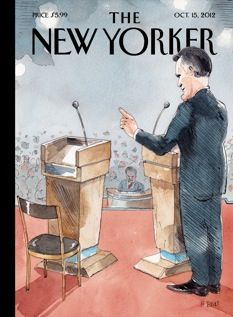
Extroversion
How Obama's Liberal Brain Lost The Debate
The psychology behind the President's universally panned performance.
Posted October 11, 2012
I've been very slammed lately, so I have not been able to write about President Obama's terrible first presidential debate performance from a psychological perspective. That's too bad, because there is so much to say! But recently, I was interviewed by The National Memo about my book The Republican Brain, and in the process, I got to articulate much of what I would have written if I'd had time!
Here is the most relevant snippet:
What do you think got in Barack Obama’s way during the last debate?
He was a textbook case of a kind of liberal psychology that mars effective communication. If you are too tolerant of and sensitive to nuance and ambiguity, it is easy to get mired in details and complexities and fail to have a message, or to demonstrate what others perceive to be decisive leadership. I think that is what we have seen of Obama on many occasions, and most of all in the dreadful first debate performance. In contrast, Mitt Romney showed many conservative traits in the debate, including decisiveness and conviction and, notably, extroversion. That’s not generally a big difference between left and right, but some studies do say conservatives are more extroverted. Clearly, Romney was way more extroverted than Obama—and Jim Lehrer—that night, and I am pretty sure that he is in general. That means he is going to be hard for Obama to handle.

In other words, Obama got steamrolled by a decisive and confident extrovert. And so, notably, did Jim Lehrer, the so-called "moderator." In this context, Obama effectively "vanished" from the debate, as so memorably (and painfully) captured in the latest New Yorker cover image.
In contrast to the energetic and extroverted Romney, Obama 1) got repeatedly mired in details; 2) was nuanced about Romney, and pointed out lots of areas where he "agreed" with his challenger, blurring the difference between them; 3) failed to frame his opponent; and 4) failed to deliver a clear and crisp message about why he should have four more years.
By contrast, look at how sharply and unforgettably Bill Clinton framed Mitt Romney on the campaign trail yesterday. It has all the reporters talking.
In the next debate, if Obama wants to right his ship, refuting Romney's battery of assertions won't be enough. He'll have to refute them briefly while simultaneously transitioning into a message about what Romney's shifting positions and questionable claims say about him as a person. And then, Obama will have to go further to present a clear and sharp contrast between that person, and his vision for the country.
It's doable—that is, if Obama doesn't let facts, details, and nuance mess it all up—and if he doesn't act like an egghead. He needs to remember: Facts don't win debates. Messages do. And any facts not organized to support clear messages are just getting in the way.

